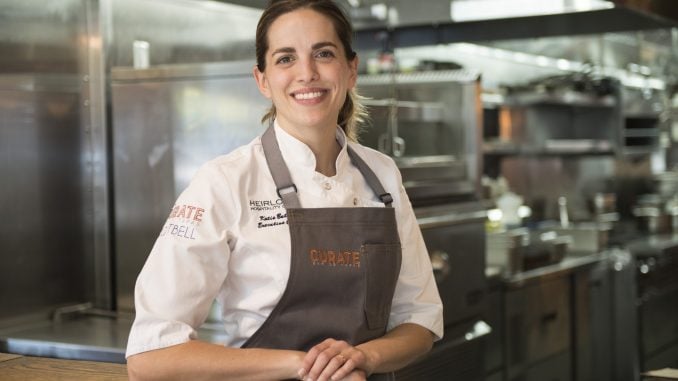
ASHEVILLE — A plate filled with fresh, seasoned and cooked to perfection ingredients leaves you relishing the taste and not wanting to waste a single piece. In the kitchen, culinary geniuses are crafting ways to bring you one-of-a-kind dishes through eco-friendly approaches. Everyone’s cooking and savoring till the very last drop.
Culinary great and chef Katie Button is helping make Asheville the next food destination through her unique blend of Spanish and American cuisine in her restaurants, Curate and Nightbell, as well as for her ability to use foraged and local foods in a variety of ways.
“Appalachian cuisine focuses on ingredients grown here and gives a nod to tradition,” said Button. “The history and the people who live in this area, where these dishes came from such as dried apple stack cake are all products made from preserving and saving something.”
“You have a whole pig for your family. You can’t eat all of it in one sitting and it might be the only pig your family has for the year, so you have to cure, smoke, freeze and save parts of it to use throughout the year,” she added. “It’s about reducing food waste and saving things. That is what drives our menu development. To me, that’s what Appalachian cuisine is.”
Button comes from a long line of cooks: her mother, grandmother, and great-grandmother all helped forge a path for Button in developing an interest in food and preservation.
“One of my strongest memories is cooking with my grandmother at her house. She used to have a wonderful vegetable garden,” said Button. “I remember working with her and making zucchini brownies out of the zucchini that would grow in her garden. When you grow zucchini, you always have way more than you know what to do with and you end up with many dishes that include zucchini.”
“I always appreciated her desire to grow her own food, save it and make the most out of it and teach me how,” added Button.
Button was born in the South, raised in the North and educated in Europe. She has a master’s degree in biomedical engineering in addition to a culinary resume that includes studying under legendary chefs Jose Andres in the United States and Ferran Adria at elBulli in Spain.
“Spanish cuisine kind of found me,” said Button. “Meeting my husband, working in Spain and learning from Jose Andres, it kind of felt like fate that I spent most of my professional time studying Spanish food, which is one of the reasons we opened a restaurant focused on Spanish cuisine.”
Life in Spain served Button well. She met her husband, Felix Meana, and eventually the two brought the old-world traditions and sizzling tastes of the country to Asheville where they opened Curate in 2011. Curate, which translates to “cure yourself” in Spanish, centers around the ideologies of the curative effects of sharing food and wine on small plates with family and friends.
“When you go to Spain, the big thing that strikes me about that cuisine is that they are focused on the products at hand and they pick the best products they can find and end up preparing it very simply and straight forward,” said Button. “It is all about showcasing the quality of the actual product you’re finding.”
Eggs, dairy, produce and more come from regional farms with a few Spanish ingredients brought in from outside the area. Dishes to share include brandade de bacalao, traditional cod and potato puree served hot, and setas al jerez, sautéed mushrooms with a splash of sherry. Button’s second restaurant, Nightbell, which focuses on Appalachian cuisine, opened in 2014. Here you can plainly witness Button’s knack for creating the most from sustainable products while delivering unforgettable dishes to patrons.
“We get in four quarters of cow. We can get a better product when we get four quarters, and then we can save everything for different uses,” said Button.
“Our farmer can dry age the whole quarter for us for a longer period of time than if we ordered cuts. We get all the bits and pieces. We can use the meat for tartare, pieces for steaks, use the fat to make a tart crust by using it in the dough,” she added.
“We are making our own cultured butter with greens from ramps. We are pickling the bulbs and using the greens to be whipped into butter. When we make cultured butter, we are left with buttermilk and end up turning that into a sauce for a turnip dish.”
And then there’s the turnips. She separates the greens from the tops and cooks the roots. Greens are turned into a sautéed greens dish with bacon fat that’s served with house-made vinegar. The vinegar is made from the ends of the wine left in opened bottles from “wine by the glass” pours.
“I can’t think of anything more Appalachian than cooking with leftover bacon fat,” said Button. “When you look at our menu you can see the dishes weaving together one after the other through the ingredients when have in the restaurant.”
The ability to conserve and use every piece of a vegetable, animal or plant can be an extraordinary concept for the novice cook or a brilliant challenge for the experienced chef. Button takes pine needles and turns them into a delicate sauce perfect for topping on crème brulee.
“We are using local pine needles in the area Southern pines as they are everywhere and easy to prepare,” she said. “When blended with water it turns bright green, and you’ll end up with a juice flavor. Add a little sugar and a little acidity such as grapefruit. The result is this wonderful puree sauce of a pure pine essence. Southern pines are soft in flavor and not super Christmas tree like. The sauce is delicious with an interesting flavor.”
Whether you aim to cure yourself, ring a bell for tradition, or devour sweet, spicy, Spanish or Southern on a plate, there’s something for everyone. And you’ll join the vast array of people savoring each piece to the very last drop.



